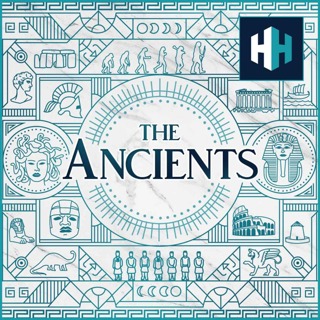
Roman Military Tombstones: Uncovering the Unknown Warriors
From Northern Britain to the Near East, Roman tombstones have been uncovered on various far flung frontiers of the Roman Empire. Dedicated to those auxiliaries and legionaries that perished far from home, guarding a distant border of this ancient empire. These objects provide an extraordinary insight into the lives of these fallen soldiers and how they were honoured. But these memorials don’t just provide information about the tomb’s deceased occupant. They can tell us so much more. About variation in tombstone designs, about the larger military community stationed on that frontier and about the importance of memory for these soldiers. To talk through this astonishing topic, Tristan was delighted to be joined by Ewan Coopey, from Macquarie University in Sydney. A Roman tombstone fanatic, Ewan has done a lot of research into funerary monuments on Roman frontiers, particularly regarding those belonging to Legio VII, based in Dalmatia. Hosted on Acast. See acast.com/privacy for more information.
28 Jan 202139min

The Mystery of the Ninth Legion
The legions of Rome were the nucleus of Rome’s military might for centuries. From campaigning in northern Scotland to the Persian Gulf, these devastating battalions extended and cemented Roman power. Yet of these legions there was one whose end is shrouded in mystery: the Ninth Legion. So what might have happened to this legion? Joining me to talk through the theories surrounding the Ninth's disappearance is Dr Simon Elliott. Simon has recently written a book all about the Ninth's disappearance, and in this podcast he takes us through the various theories and evidence surrounding this mystery. Hosted on Acast. See acast.com/privacy for more information.
24 Jan 202139min

Edges of Empire: The Sasanian Frontiers
For centuries, arguably the greatest external threat the Roman Empire faced came from the East. From the Sasanian Persian Empire. With its nucleus situated in Iran, at its height the Sasanian Empire was one of antiquity’s most formidable kingdoms, controlling lands that stretched from the Hindu Kush to the River Euphrates. Like the Romans, the Sasanians had to deal with various potential threats. From the north, from the lands of the steppe east and west of the Caspian Sea, nomadic peoples such as the Huns would become renowned for descending on Roman and Sasanian territories and wreaking havoc. And so, on the edges of their empire, the Sasanians constructed frontiers of various forms. For military purposes, yes. But also for economic and political purposes as will be explained.In this podcast, we’re going to look at some of these Sasanian frontiers. From a dominating fort a ‘top an alpine gorge in the Caucusus to a barrier that makes Hadrian’s Wall pale in comparison. To talk through this incredible topic, I was delighted to be joined by Dr Eve MacDonald from the University of Cardiff. Alongside her research on the Sasanian Empire and its frontiers, Eve has also done work surrounding the ancient history of Carthage and of North Africa. She is the author of ‘Hannibal: A Hellenistic Life’. Hosted on Acast. See acast.com/privacy for more information.
21 Jan 202144min

Indonesian Cave Art: A Dramatic New Discovery
It’s a paradox for the ages, breaking news about people who lived and died thousands of years ago. This discovery is no different, because Adam Brumm and his team in Sulawesi have released their discovery of the oldest known figurative art made by modern humans. And the oldest known cave art depicting the animal kingdom. The paintings on the Indonesian island are over 45,500 years old, and feature three pigs alongside the stencilled outlines of the hands of their prehistoric painter (perhaps). Listen as Adam tells Tristan about his research on this beautiful island, how the pigs were discovered and what they can tell us about the first humans to arrive in Southeast Asia. Hosted on Acast. See acast.com/privacy for more information.
17 Jan 202143min

Tomyris: A Warrior Queen's Revenge
Her legend afforded her a place alongside Eve, Cleopatra and Venus, to name just a few of the famous women whose biographies were collected by Giovanni Boccaccio in 1361-2. Though not a household name as the others may be, Tomyris’ story contains all of the hallmarks of an epic. Tomyris was Queen of the Massagetae people, from present day Central Asia, in the 6th century BC. She is remembered in Herodotus’ first book for her vengeful challenge to the bloodthirsty Cyrus the Great. To talk about Tomyris, Queen and commander, Tristan was joined by Christian Djurslev of Aarhus University. Hosted on Acast. See acast.com/privacy for more information.
14 Jan 202140min

Oppian’s Halieutica: Creatures of the Ancient Deep
The deep blue sea is the subject of speculation to this day but, in this episode, we have access to the mysteries, myths and misgivings that were associated with the ocean in the 2nd century AD. The Halieutica was written in Hexameter by the Greek poet Oppian, and dedicated to the then Roman Emperor Marcus Aurelius and his son Commodus. Emily Kneebone from the University of Nottingham has recently completed a monograph on this overlooked Epic, and she is here to tell us about the sea and its often personified, often hostile inhabitants. Hosted on Acast. See acast.com/privacy for more information.
10 Jan 202146min

Hannibal: Battle by the Trebia
It’s 218 BC, and Hannibal has made the mammoth journey across the Alps en route to Italy, accompanied by his army, their horses, and their elephants. But the real battle is yet to come, and in this fantastic second episode with Louis Rawlings, he takes us onto the battlefield with the Carthaginian army and into the fight against their Roman and Allied opposition. Louis and Tristan discuss the strengths and weaknesses of each side, and the tactics deployed under Hannibal’s remarkable leadership. Hosted on Acast. See acast.com/privacy for more information.
7 Jan 202145min

How Ancient Egypt Stayed Egyptian
The length of time between the rule of Cleopatra and the erection of the Pyramids is the same as that between now and the birth of Jesus Christ. With that in mind, it is perhaps no surprise that some periods of Ancient Egypt fall beneath the radar. The Late Period of Ancient Egypt, however, is not without drama. These final centuries are characterised by repeated invasions and leadership by foreign rulers. Chris Naunton is an Egyptologist, writer and broadcaster. He spoke to Tristan about the influence of external forces on Ancient Egyptian society from the Third Intermediate Period through the Late Period. This included Libyan, Assyrian, Persian and, notably, an Ancients’ favourite, the Macedonian Alexander the Great. Hosted on Acast. See acast.com/privacy for more information.
3 Jan 202155min





















